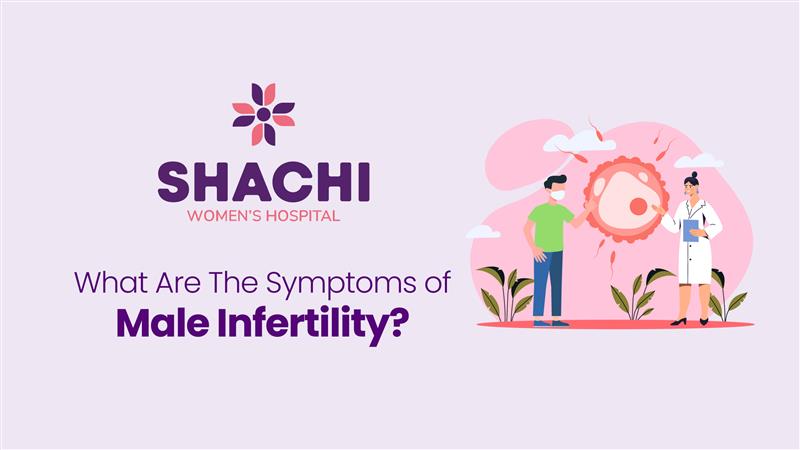
Before family planning begins, if months go by with no luck, the woman is generally asked to undergo tests. But what does that mean from the other half of the equation? While far less discussed than female infertility, male fertility factors (or lack thereof) contribute to infertility in about 50 per cent of all cases. Male infertility makes up about half of all infertility cases, and a lot of the time, men do not even know there is an issue until it is too late. Of course, you have options for it; you can detect it with a Male Fertility Test in Ahmedabad at Shachi Women’s Hospital and get the possible solutions, but for that, you need to know the symptoms. The earlier you can recognise male infertility symptoms, the better your chances of getting proper treatment early on.
What then ought men to look for?
Recognising the Symptoms of Male Infertility
Unlike many medical concerns, the symptoms of male infertility aren’t always clear-cut. While problems with sexual function, like trouble ejaculating, reduced sexual desire, or erectile dysfunction, may raise red flags, many men display no obvious outward signs. However, several physical and hormonal symptoms can suggest a problem is present.
Difficulty Conceiving After Regular Intercourse
Infertility in a man is often identified through his inability to impregnate a woman or the inability to conceive after more than a year of regular unprotected intercourse. Although this does not automatically imply that the problem is with the male, it is a call for both to start testing. However, if you and your partner have been trying without success for a few months, then it may be time to start thinking about male infertility.
This is where it becomes crucial to understand the symptoms of male infertility, as the cause might be an underlying medical, hormonal or even a lifestyle problem.
Sexual Desire or Libido is Low
A symptom that is not often discussed, yet very real, is a decrease in sex drive. Because sexual desire can be reduced by hormonal imbalances, including low testosterone, fertility may be affected indirectly. Low sex drive! Also, you may have a low sex drive due to various stressors like fatigue, but unceasingly discuss it with your doctor.
Keep in mind, fertility is not just about heading to the bedroom! You also have the quality of sperm produced with ejaculation.
Erectile Dysfunction, or Being Unable to Have or Hold an Erection
Not being able to get or maintain an erection signals several health problems and is a danger sign. This may be associated with hormonal disorders, circulatory disorders or psychological stress. But just attributing it to an old age problem is something that guys more often should really not shrug off.
Certainly, it might not come off as an apparent connection. But most of the time, the issue with sexual performance tends also to be one of the earliest undetectable indications that is probably brushed aside.
Testicular Area Pain, Swelling or Lumps
Testicular pain (or an enlarged testicle) could be due to varicocele (where the veins in the scrotum get distended), infections or even a tumour, all of which can not only slow down production but also affect sperm quality. The testicular region is an area that can never be ignored if there is any pain or unusual feeling.
This physical discomfort is worse than just inconvenient. But it can also be your body's way of alerting you that something is not right with your reproductive health.
Alterations in How You Grow Hair or Muscle Mass
In men, testosterone plays a pivotal role in not only fertility but also in other physical attributes like body hair and muscular development. Hair thinning, becoming less hairy in the face or body, and a notable drop in muscle mass could all result from hormonal imbalances.
These hormone-related changes are rather vague symptoms of male infertility, but can easily be picked up by a simple test called a hormone profile.
Smaller-Sized Than Normal
Testicles are very important when it comes to making sperm. If you have noticed that your testicles are, for some reason, smaller and harder, this could indicate underdevelopment or other issues. It could essentially mean that the testes are not producing sperm, respectively. Weak testicles or heat-seeking behaviour (looking for significantly warmer locations)
Though these variations might appear tiny or complicated, they are possible signs of male infertility that a medical professional should oversee.
Recurrent Respiratory Infections or Issues
As much as it might still sound strange to some, different genetic syndromes can affect both the respiratory system and the male reproductive tract, such as cystic fibrosis. Men with admitted frequent respiratory infections may also have structural abnormalities that could affect the passage of sperm.
It is not common, though it can occur in conjunction with other symptoms of male infertility.
Final Thoughts
Infertility ain't always screaming at you or hitting you over the head with a stick. Most of the time, it's just a whisper, so you have to pay attention. Since reliable male infertility tests may not be readily available or affordable, it is crucial that you fully understand the symptoms of the condition so you can take action to fix it quickly.
If you or your partner has any concerns that might be related to fertility, please get checked out at Shachi Women’s Hospital. But the real cause of male infertility can be tackled with proper guidance and support, and forming a family is still possible.


